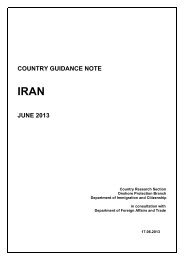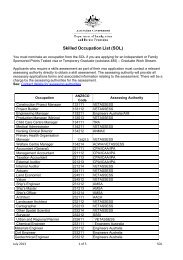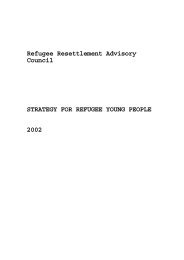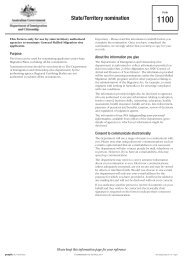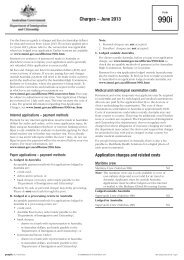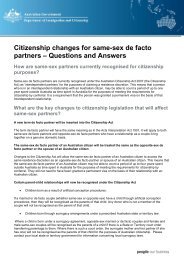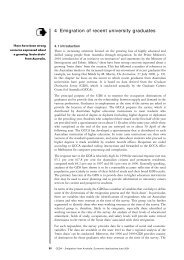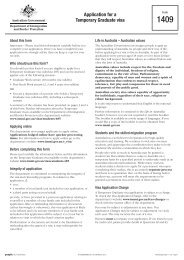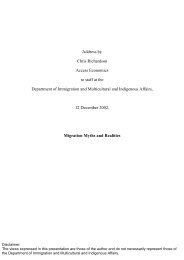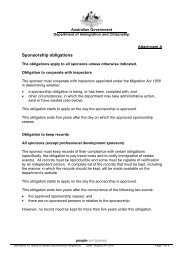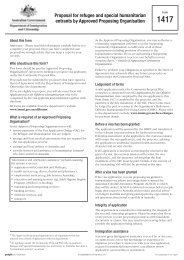Evaluation of the Integrated Humanitarian Settlement Strategy (IHSS)
Evaluation of the Integrated Humanitarian Settlement Strategy (IHSS)
Evaluation of the Integrated Humanitarian Settlement Strategy (IHSS)
You also want an ePaper? Increase the reach of your titles
YUMPU automatically turns print PDFs into web optimized ePapers that Google loves.
facilitation <strong>of</strong> appropriate referrals to general practitioners and o<strong>the</strong>r health services as<br />
indicated through <strong>the</strong> assessment and requested by <strong>the</strong> entrant<br />
with <strong>the</strong> permission <strong>of</strong> <strong>the</strong> entrant, ensuring that critical information is provided to health<br />
service practitioners necessary to <strong>the</strong> effective treatment <strong>of</strong> <strong>the</strong> entrant, including any issues<br />
that may influence <strong>the</strong> entrant’s acceptance <strong>of</strong> assessment and treatment procedures, and<br />
any pre-existing treatment regimes.<br />
(c) A comprehensive and appropriately structured assessment <strong>of</strong> psychological symptomatology and<br />
social functioning that takes into account <strong>the</strong> effect <strong>of</strong> past experiences <strong>of</strong> trauma and torture and <strong>the</strong>ir<br />
potential to inhibit <strong>the</strong> entrant’s ability to settle in Australia. The psychosocial and psychological<br />
assessments include:<br />
<br />
<br />
<br />
<br />
<br />
an assessment <strong>of</strong> post-traumatic symptoms including depression, anxiety, and associated<br />
symptoms as well as <strong>the</strong> effects <strong>of</strong> grief, loss and anger as components <strong>of</strong> <strong>the</strong> trauma response<br />
an assessment <strong>of</strong> <strong>the</strong> quality <strong>of</strong> daily functioning and <strong>the</strong> extent to which, if at all, psychosocial<br />
issues may be contributing to a diminished level <strong>of</strong> participation in <strong>the</strong> community or o<strong>the</strong>r<br />
settlement support services<br />
<strong>the</strong> formulation <strong>of</strong> case plans arising from <strong>the</strong> assessment that details <strong>the</strong> range <strong>of</strong> interventions<br />
required and agreed to by <strong>the</strong> entrant<br />
where assessments indicate <strong>the</strong> need, <strong>the</strong> facilitation <strong>of</strong> referrals to a range <strong>of</strong> health and<br />
community service providers<br />
development <strong>of</strong> measures to commence to address <strong>the</strong> entrant’s needs in various areas as <strong>the</strong>y<br />
are identified in <strong>the</strong> assessment process.<br />
(d) A range <strong>of</strong> short-term psychosocial and psychological interventions that will:<br />
assist <strong>the</strong> entrant to manage <strong>the</strong>ir recovery from serious traumatic and psychological difficulties<br />
assist <strong>the</strong> entrant to benefit from <strong>the</strong> health, community support and resettlement services<br />
available to <strong>the</strong>m<br />
prevent deterioration <strong>of</strong> entrants who need long term counselling by providing interim counselling<br />
as appropriately indicated through assessments, interventions consisting <strong>of</strong> a range <strong>of</strong> possible<br />
strategies including:<br />
psycho-educative strategies designed to streng<strong>the</strong>n <strong>the</strong> entrant’s understanding <strong>of</strong> issues<br />
affecting <strong>the</strong>m and <strong>the</strong>ir families and how <strong>the</strong>se can be managed<br />
provision <strong>of</strong> symptom management strategies that alleviate symptoms <strong>of</strong> psychological<br />
distress and reinforce <strong>the</strong> entrant’s capacity to cope independently<br />
working through <strong>the</strong> case plans arising from <strong>the</strong> assessment with <strong>the</strong> interventions required<br />
and agreed to by <strong>the</strong> entrant<br />
<strong>the</strong> provision <strong>of</strong> short term counselling that assists entrants in addressing those emotional and<br />
psychological difficulties which are significantly affecting <strong>the</strong>ir ability to cope in <strong>the</strong> early<br />
stages <strong>of</strong> <strong>the</strong> resettlement process<br />
facilitating referrals for longer-term counselling and casework services in situations where <strong>the</strong><br />
psychological difficulties have been compounded by new information or experiences, or<br />
where <strong>the</strong> traumatic effects <strong>of</strong> past experiences require long term interventions.<br />
In addition to direct services to entrants, EHAI service providers are required to provide training to a<br />
range <strong>of</strong> service providers including mainstream health services, general and specialised medical<br />
practitioners, settlement services providers, <strong>IHSS</strong> funded services, and o<strong>the</strong>r relevant services, in<br />
12<br />
<strong>Evaluation</strong> <strong>of</strong> <strong>the</strong> <strong>Integrated</strong> <strong>Humanitarian</strong> <strong>Settlement</strong> <strong>Strategy</strong> 27 May 2003



